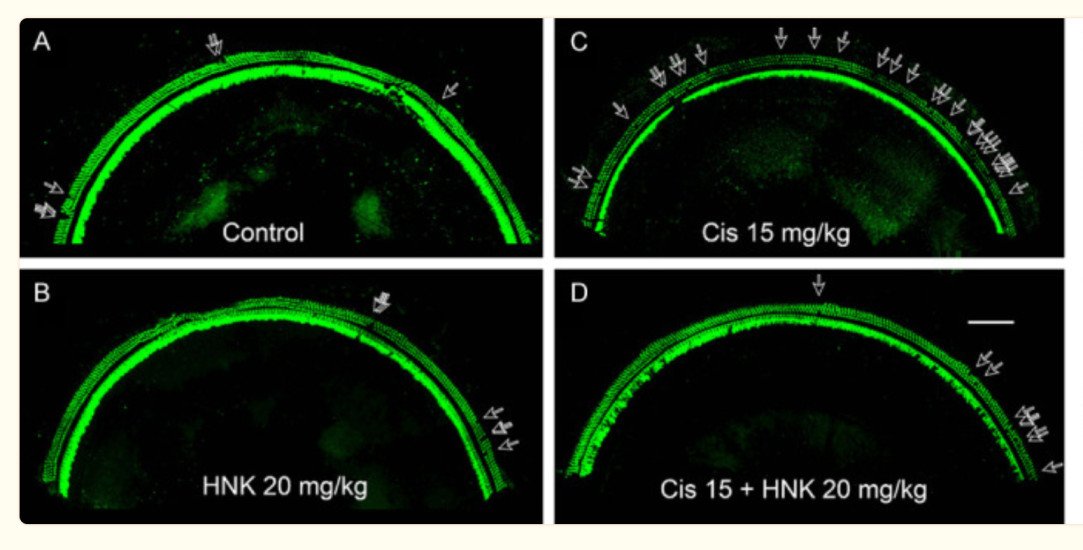By Xiaodong Tan, Ph.D.
Platinum-based chemotherapeutic drugs are used in about 40 percent of cancer treatments. As potent as they are, severe side effects, such as damage to the brain, liver, kidney, etc., may occur.
As a major side effect during chemotherapy, cisplatin ototoxicity (CO, damage to the inner ear) affects an estimated 100,000 to 300,000 cancer patients annually in the U.S. The symptoms include severe hearing loss, tinnitus, and dizziness. CO is related to the accumulation of reactive oxygen species (ROS), causing the loss of the outer hair cells (OHC), one of the two sensory hair cell types for hearing function in the inner ear.
To date, no effective Food and Drug Administration–approved treatment is available to protect against CO. The major concern of the candidate treatments is the interference of the therapeutic effects either by deactivating cisplatin or protecting tumor cells.
Recent work by our team (my lab and that of Claus-Peter Richter, M.D., Ph.D.) shows for the first time that honokiol, a multifunctional small molecule extracted from herbal medicine (the genus Magnolia), prevents cisplatin-induced hearing loss both in vitro (in cultured cells derived from the inner ear) and in vivo (in mice).
Furthermore, this hearing protective effect of honokiol has also been verified on a transgenic tumor-bearing mouse model in chemotherapy regimen mimicking standard clinical treatments (three cycles; in each cycle, cisplatin was given 4 mg/kg/day for four days through injection, followed by a 10-day recovery interval).
After the three-cycle treatments, cisplatin induces a severe hearing loss and OHC loss in the high frequency region (over 16 kilohertz), which is significantly reduced by parallel honokiol treatments (10 mg/kg/day, injected one hour before cisplatin). Meanwhile, the tumor growth is significantly slower, and animal survival rate is higher, in the honokiol and cisplatin group than in the cisplatin-only group.
Confocal images of the middle turns (Segment 3, frequency range: 19.1-36.5 kHz) immuno-stained with Myosin 7A, showing hair cell loss after honokiol (HNK) and/or cisplatin treatment. Severe OHC loss was induced by treatment of cisplatin 15 mg/kg (C), which is largely reduced by pre-treatment of HNK 20 mg/kg (D). Scale bar: 100 µm. Data represent mean ± SEM. Credit: American Journal of Cancer Research
These results indicate that honokiol is synergistic with cisplatin in tumor suppression, which is consistent with previous publications. Further studies show that the mechanism is related to the upregulation of sirtuin 3, a critical enzyme in mitochondria essential for ROS detoxification. The sirtuin 3 expression level is upregulated in the hair cells after honokiol treatment.
Our study indicates that honokiol is a promising candidate for hearing protection against CO. Honokiol is approved by the European Food Safety Authority as a food supplement and has been tested for its anti-asthma and anti-anxiety activities in preclinical trials.
As a result, we expect a paradigm shift in cisplatin chemotherapy based on the current study and future clinical trials, where honokiol is applied to reduce side effects including hearing loss. Our paper, published in the American Journal of Cancer Research in December 2020, formed the basis for my National Institutes of Health R01 project titled "Hearing Protection in Cisplatin Chemotherapy,” which was funded in February 2022.
A 2017 Emerging Research Grants scientist, Xiaodong Tan, Ph.D., is a research assistant professor in the department of otolaryngology at Northwestern University’s Feinberg School of Medicine.








New research has identified how two distinct genes guide the regeneration of sensory cells in zebrafish. The discovery improves our understanding of how regeneration works in zebrafish and may guide future studies on hearing loss and regenerative medicine in mammals, including humans.